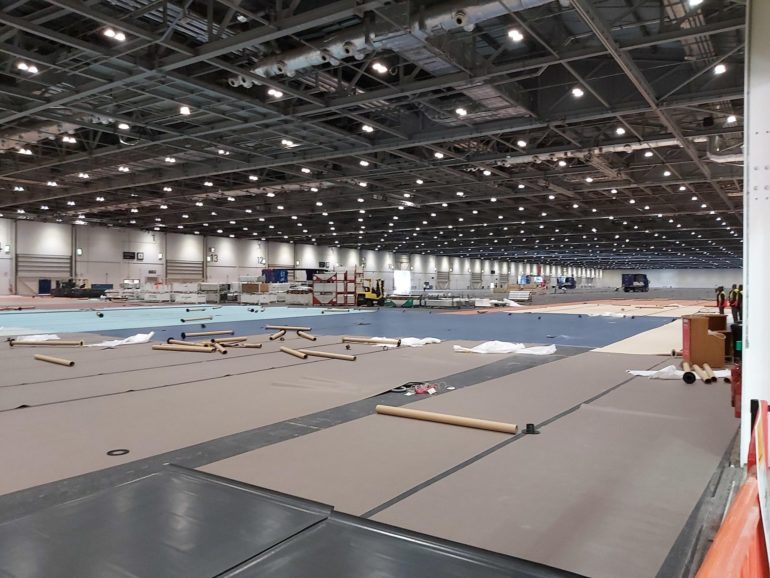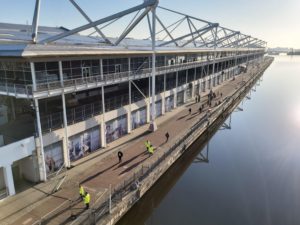Rachel J. Thomas (She/Her) is Senior Business Partner: Health, Safety and Wellbeing with the Mace Group. John Kersey was recently deployed on the NHS Nightingale project and took the opportunity to ask Rachel about some of the transformative experiences in her life.
John Kersey (JK): “It was great to unexpectantly meet you on the Nightingale project and we had a lot to catch up on. Although we worked together at ISS for a long time, I’m not sure how you got involved in health and safety?”
 Rachel J. Thomas (RJT): “I have been involved with Health, Safety and Wellbeing for approaching 25 years. It is amazing how quickly that time has flown past. I actually studied Fine Art originally but fell into the Built Environment industry as painting was unlikely to pay the bills. I was working for an FM outsource company for Bae Systems when my employer suggested a role as a Regional Health and Safety Manager. It immediately felt like the right thing to do; I enjoyed the work and felt as though I was really making a difference to the lives of others.”
Rachel J. Thomas (RJT): “I have been involved with Health, Safety and Wellbeing for approaching 25 years. It is amazing how quickly that time has flown past. I actually studied Fine Art originally but fell into the Built Environment industry as painting was unlikely to pay the bills. I was working for an FM outsource company for Bae Systems when my employer suggested a role as a Regional Health and Safety Manager. It immediately felt like the right thing to do; I enjoyed the work and felt as though I was really making a difference to the lives of others.”
(JK): “I know you moved back to Carillion – how was it like returning to your former company?”
(RJT): “Prior to my role at ISS I had worked for Carillion for many years. I was due for a change and ISS offered a fantastic opportunity. Nonetheless, three years or so down the line, Carillion approached me to discuss a new role with a wider remit. It was a role that would allow me to, ultimately, entirely reshape how an Integrated Management System Function could work in a progressive organisation.”
(JK): “Of course the subsequent collapse of Carillion was well publicised – how did that affect you on a personal level?”
(RJT): “Guiding a function and a team through such a turbulent time was, quite possibly, the most challenging but rewarding thing I have done in my career. The team were brilliant; the loyalty, collective sprit and the sense of doing a good job (keeping people safe, above all else) right to the end was really humbling. The pride I have in those people, those friends, will never be diminished.”
(JK): “Were there any lessons in terms of career development you drew from this that could help other practitioners?”
(RJT): “Looking back on the last year with Carillion I would say that was the time I really learned how to be a manager of people. Health, Safety and Wellbeing is all about people. Carillion had a fantastic IMS Management System, a generation ahead of anything else I have worked with over the years, but this means very little if the team guiding that system into a business is not fully committed. What success I had in managing that system was directly proportionate to the success the team had. Career development, I believe, is a team pursuit.”
 (JK): “You then moved to construction company Mace Group – what attracted you to them as an organisation?”
(JK): “You then moved to construction company Mace Group – what attracted you to them as an organisation?”
(RJT): “After leaving Carillion I was in no hurry whatsoever to get another job. I had the opportunity to take a break, take stock and take a look at how I wanted my life to progress. Others had a different idea and one agency were quite persistent in suggesting I talk to Mace – to be honest I was looking to probably move away from the Built Environment Industry and so I politely declined. On the third approach it was mentioned that the person who wanted to meet me was very active in LGBT+ promotion and equality. I should point out that the agency were oblivious to my intended transition; but if a company was going to promote themselves to potential employees in this manner then I was interested. I started with Mace three months later.”
(JK): “The construction industry had the reputation of being a macho, rufty tufty environment – how has the change in your gender identity been received?”
(RJT): “The reputation and the reality are perhaps not quite the same. When I transitioned nobody batted an eyelid, to be honest. It was a bit of non-event in many ways. If anything people were really positive, encouraging and somewhat rather excited. More so they were genuinely proud that they worked for a company where someone could be true to their identity.
I work within the Consultancy part of Mace. This does on occasion take me out to sites and I regularly work with our supply chain partners. When the boots and high-viz go on we all just get on with the job.”
(JK): “If someone wanted to change their gender identification in the workplace, how would you recommend they approach this?”
(RJT): “You are going to need friends. Work on creating a support network that you trust and you can rely on. Work out who you are going to confide in; understand who is going to hold your hand – believe me, you are going to need this. You can’t tackle this on your own. When I actually came out I already had a close knit support group who were on the inside. They gave me the support, confidence and self-belief to continue on the journey.
“Secondly, many companies now have a trans policy and lots of good intentions, but more often than not little practical experience. Be prepared to guide and lead your company (after all, it is your transition), and know what to do and how to do it (such as changing name, tax, passport and so forth).
“Finally, focus on you, transition for you, move at your own pace. Transition is very scary, I spent a many years being terrified, but ultimately it will work out ok.”

(JK): “And then the coronavirus pandemic happened… How did you become involved in the NHS Nightingale project?”
(RJT): “It started with a phone call on a Sunday afternoon. The Mace role in the project started relatively small but was growing fast. We had a construction health and safety specialist in the site team from day one but we needed someone who could look at the strategic interface between the various stakeholders, consider the future assurance aspects and also bring some focused planning to the wellbeing of our own people. This last point has been my primary activity. Nightingale is a fabulous project but often an intense environment; people are giving everything. The wellbeing support that Mace could offer was critical.”
 (JK): “What do you feel is the secret behind the success of the project?”
(JK): “What do you feel is the secret behind the success of the project?”
(RJT): “From a Mace perspective… agility and teamwork. We were engaged initially in a Construction and Project Management role. Although in a greatly compressed timescale, we have brought the typical Mace expertise around planning and delivery; knitting together the various aspects that combine to deliver a successful project.”
(JK): “Post pandemic; how do you feel the safety industry will change?”
(RJT): “The greater emphasis on the holistic wellbeing of people that has developed in recent years will become even more prominent in shaping how work is delivered safely. The pandemic is giving us pause and a moment for recalibration in our society. The health and safety industry needs to reflect upon this time wisely.”
(JK): “You’ve certainly experienced a lot of change! Any personal thoughts on the process of managing transformation?”
(RJT): “Ultimately it all comes down to trust. Trust your team and colleagues, engender their trust in you. Be open to ideas and give people the licence to explore those ideas. We talk about bringing ‘your whole self to work’ – let this happen, encourage diversity in identity and thought, and allow those identities to breathe. Transformation is continuous, so for all organisations learning must be continuous also. To transform, never stop learning.”
What makes us susceptible to burnout?
In this episode of the Safety & Health Podcast, ‘Burnout, stress and being human’, Heather Beach is joined by Stacy Thomson to discuss burnout, perfectionism and how to deal with burnout as an individual, as management and as an organisation.
We provide an insight on how to tackle burnout and why mental health is such a taboo subject, particularly in the workplace.

 Rachel J. Thomas (RJT): “I have been involved with Health, Safety and Wellbeing for approaching 25 years. It is amazing how quickly that time has flown past. I actually studied Fine Art originally but fell into the Built Environment industry as painting was unlikely to pay the bills. I was working for an FM outsource company for Bae Systems when my employer suggested a role as a Regional Health and Safety Manager. It immediately felt like the right thing to do; I enjoyed the work and felt as though I was really making a difference to the lives of others.”
Rachel J. Thomas (RJT): “I have been involved with Health, Safety and Wellbeing for approaching 25 years. It is amazing how quickly that time has flown past. I actually studied Fine Art originally but fell into the Built Environment industry as painting was unlikely to pay the bills. I was working for an FM outsource company for Bae Systems when my employer suggested a role as a Regional Health and Safety Manager. It immediately felt like the right thing to do; I enjoyed the work and felt as though I was really making a difference to the lives of others.” (JK): “You then moved to construction company Mace Group – what attracted you to them as an organisation?”
(JK): “You then moved to construction company Mace Group – what attracted you to them as an organisation?”
 (JK): “What do you feel is the secret behind the success of the project?”
(JK): “What do you feel is the secret behind the success of the project?”